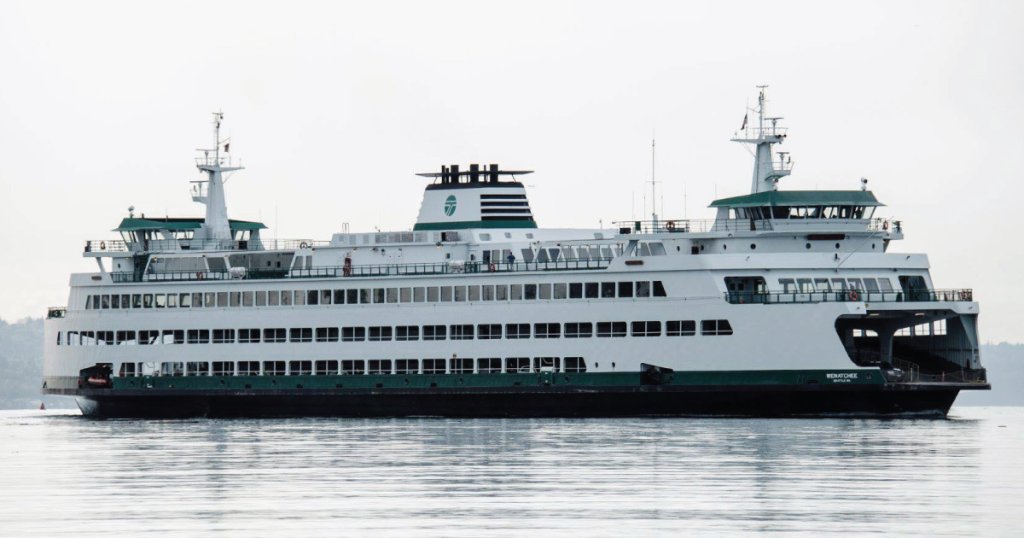SEATTLE—Washington State Ferry engine room workers, backed by their union Marine Engineers Beneficial Association (M.E.B.A.), launched a public petition on Tuesday, August 6, asking Governor Jay Inslee to direct the state in providing competitive pay to retain and recruit engine room crew, which they say is paramount to restoring a safe and reliable ferry system.

The announcement came at a press conference held on Tuesday, August 6, at the Seattle Ferry Terminal on Pier 52’s Colman Dock where several workers spoke about how the state’s ferry system’s low pay and poor management have resulted in cancelled sailings and a backlog of repairs and maintenance.
Ferry ridership is returning to pre-pandemic levels, but service is unreliable, Kristin Hyde, Press Secretary for the M.E.B.A. union told the Lynnwood Times, with more than 3,500 canceled sailings in 2023 and continuing disruptions to service through 2024.
“The lack of highly trained, essential engine room crew to run ferries each day is the number one reason for canceled ferry sailings, and low pay is the number one reason why the ferries are short staffed,” said Roland Rexha, Secretary Treasurer of the Marine Engineers Beneficial Association (M.E.B.A). “Engine room crew aren’t as visible to the public as deck crew, but ferries can’t run, get needed maintenance or repairs without them.”
Approximately 400 of Washington State’s 1,800 ferry employees are marine engineers represented by the Marine Engineers Beneficial Association, a nationwide union that represents marine engineers and deck officers.
Marine engineers and oilers are pivotal to the Washington State Ferry system to operate, repair, and maintain its vessels. Without a fully staffed crew, boats are tied up and cannot run, causing delays and cancelled sailings that affect the people, businesses, and communities that rely upon them.
“Some engine room crew members are being asked to work 100 hours of overtime per month,” said Eric Winge, Washington State Ferries representative for M.E.B.A. “It’s unreasonable, causes burnout and threatens safe operations. The state’s refusal to address pay disparity is pushing experienced crew to take early retirement or leave for better paying private sector jobs.”
Hayden Mackley, with the Washington Office of Financial Management, confirmed with the Lynnwood Times that bargaining is currently ongoing with the Marine Engineers’ Beneficial Association (MEBA) union, along with approximately 30 other groups of represented state workers.
“Because bargaining is ongoing, we are not able to comment on specifics, but we continue to have confidence in the bargaining process and that we will come to a successful resolution with the parties,” said Mackley.
The current bargaining started last spring and is for terms and conditions to be in place for the collective bargaining agreement which will be in effect from July 1, 2025, through June 30, 2027—the current agreement runs through June 30, 2025. The state will continue bargaining and tentative agreements are due to the OFM director by October 1, 2024. The OFM director must then determine the financial feasibility of the proposed agreements.
With its 21 auto-passenger ferries across 10 routes serving 19 terminals, Washington State Ferries (WSF) is the country’s largest. WSF launched an audacious goal to be emission-free by 2050 by converting six existing vessels to hybrid-electric power, build 16 new hybrid-electric vessels and add shore charging to 16 terminals with an estimated cost of $3.98 billion.
On May 30, WSF initiated requests for bid to shipyards for construction of five new hybrid-electric, 160-automotive-capacity ferries after the Legislature, in 2023, directed the agency to build the boats. In July, WSF contracted with Swiss-based marine electrification experts ABB to select and integrate the technology to power the new vessels, from the engine and batteries to the propellers. ABB will also design a complete propulsion system, oversee the timely delivery of equipment, and offer expertise in equipment installation and commissioning.
Recently, gubernatorial candidates—Attorney General Bob Ferguson, Senator Mark Mullet, former Congressman Dave Reichert and former School Board District Director Semi Bird—have called on Governor Inslee to forego hybrid-electric for diesel-powered vessels citing time and/or cost constraints.
“The state has been running this procurement [for electric ferries] for months and is deep within the procurement with us and the shipyard selection process,” Drew Orvieto, Vice president of sales for Marine Systems, ABB U.S. office told the Lynnwood Times. “So, I think it would be a mistake to turn back now; it would delay the program significantly. I don’t think you would get diesel boats any faster. It will set us back multiple years to get a new diesel design; whereas we have a really pretty cutting-edge design on the hybrid side.”
Analysis from WSF shows that changing course would delay a new boat by two years.
Orvieto shared that the current hybrid-electric design is “mature,” and that formal bidding is to begin later this year with contracts scheduled to be awarded in early 2025.
According to Matt von Ruden, WSF system electrification program administrator, the first two hybrid ferries are scheduled to begin construction in 2026 with an estimated completion in 2028.
Author: Kienan Briscoe












